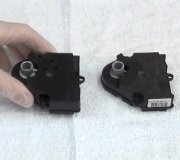That is absolutely wrong, but don't be too hard on the dealer. You will almost always be talking with a service adviser, not the mechanic. Service advisers aren't mechanics and they know relatively little about cars. Mechanics do a very poor job of communicating with car owners, so part of the service adviser's job is to interpret what they thought they heard from the mechanic into something they think you can understand, and things get lost in translation.
In this case, first of all, you didn't list any symptom or problem you're having. Second, AC generators, (everyone knows what you mean by "alternator, but that term was copyrighted by Chrysler), are physically incapable of generating more current than what they are designed for. What they CAN do is generate more current than the car's electrical system is calling for but that can only be done by raising its voltage. "Voltage" is electrical pressure. "Current" is electrical flow, just like water in a river. It's the job of the voltage regulator to maintain charging system voltage between 13.75 and 14.75 volts, and yours is perfect. In that case the generator will develop exactly the amount of current needed at that time, and no more.
It IS possible for the voltage to be correct but there's not enough current output to meet the demand. AC generators put out three-phase current. When one of the six internal diodes fails, you will lose exactly two thirds of the generator's capacity. 30 amps from the common 90 amp generator is not enough to run the entire electrical system under all conditions and keep the battery charged. If the immediate need is only 25 amps, you very likely will not notice a problem, but as soon as you switch on the heater fan or head lights, if more current is needed than what the generator can deliver, the battery will make up the difference until it slowly runs down over hours or days.
You need a professional load tester to measure that maximum current the generator is capable of, but in addition to low current, due to the missing phase when one diode is defective, "ripple" voltage will be very high. Yours is not. It depends though on the tester. If ripple voltage is measured when the tester draws a heavy load, ripple voltage will show up at its highest value. There are some testers that measure it after that external load is turned off. Part of the battery's job is to smooth out that ripple and that is much easier to do when the generator isn't working very hard. The mechanic has to become familiar with his tester to know how to interpret the numbers.
With a newer battery, it is going to do a better job of smoothing that ripple voltage. As they age they lose their ability to do that. This is a real big problem on '87 and newer GM products. Old batteries that are still working fine are the cause of repeated generator failures. I have not heard of that on VWs or any other car brand.
Wednesday, February 12th, 2014 AT 6:04 PM


